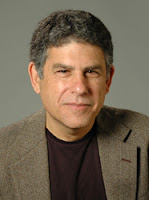 |
| Photo by John D. Fellers |
The second reading was an interesting choice, and came from Book 18 (Lines 455-597). This section describes the god of Fire, Hephaestus, crafting the new shield for Achilles. These nearly 150 lines are what Mitchell interestingly refers to as the "world's first movie", as the crippled blacksmith god lovingly tells the whole saga of human life in minute detail in the bronze, gold, tin, and silver as he fashions the shield. To hear Mitchell read these lines aloud really brought home to me the poetic beauty of The Iliad, these lines, and especially the musicality of Mitchell's wonderful translation.
The final selection that Mitchell read was from Book 24 (Lines 458-522), and is arguably one of my favorite passages in the entire poem. This scene describes the meeting between the Trojan king, Priam, and Achilles. This occurs late at night when Priam comes to the Greek camp in an effort to ransom the corpse of his dead son, Hector. These sixty-four lines are truly some of the most emotionally powerful lines in the history of poetry and document the state of grace that both men are finally able to attain whilst surrounded by the savagery and brutality of a war of absolute destruction. I find myself shedding tears each and every time I read this section of the poem, and it was no different when listening to Stephen Mitchell reading it aloud to all us. Even though these lines are loaded with the pathos of profound grief and no hope for the future of either man, there is the salvific quality of the two men--enemies in this war--being able to find the humanity in one another and reaching that state of grace together. This is truly amazingly beautiful poetry.
Mitchell entertained questions and answers about his translation for half-an-hour, or so. Even 'your's truly' piped up with a couple of questions. I asked if he would tell us a bit more about the process he utilized in translating from the Greek text, and how he made decisions on not including sections of the text that were believed to have been added much, much later in the history of The Iliad. I also asked Mitchell about his choice of the 'five-beat' meter that he used in constructing his English translation. He talked about how other translations just didn't sound right to his ear, and that he wanted to see if he could come up with a meter and rhythm that could effectively tell Homer's story, but would still work poetically and musically in English. It was his experience, and I believe to our long-term literary benefit, that his pentameter lines satisfy on both counts.
I must confess that even though I already had a copy of Mitchell's The Iliad sitting on my bookshelf at home, I purchased another and had Stephen Mitchell inscribe the title page to me. It has become an instant treasure, and one that I hope to pass on someday to one of my children in the hope that they too will come to love this poem as much as I do. Also, I will probably try and find some deserving soul to pass on my other copy of Mitchell's beautiful translation. It seems to me that there's something fitting about sharing Homer with friends and family.
Of course, I couldn't walk out of one of the Los Angeles area's finest independent bookstores without buying some other books! I bought myself a beautiful edition of Shakespeare's Sonnets and Poems (the Folger Shakespeare Library edition, and annotated as well). I also bought an edition of Shakespeare's play, A Midsummer Night's Dream (the Royal Shakespeare Company edition published by The Modern Library). All in all, a perfectly lovely day and evening!
***

You're making me want to re-read The Iliad, since my first reading of Fagles translation was such an utter disater! In the mean time, I hope to have more luck with Odyssey :)
ReplyDeleteSounds like a wonderful evening!
ReplyDelete